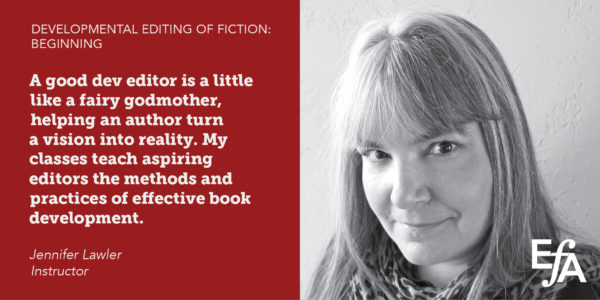Description

Our online courses are conducted through the LAMP Consortium on Sakai, a learning management system (LMS). You never need to be at your computer at any specific hour. More information about how these asynchronous classes are conducted is available here.
NOTE: Students who have registered for this course will be added to the course site the morning of January 4, not one business day before. You should expect the notification from Sakai and invitation link (if applicable) on the morning of Monday, January 4.
LEVEL: Beginning
Beginning Developmental Editing for Fiction is an online class for editors interested in working with novelists to develop their work. If you have some experience with editing but haven’t worked with fiction, then this is the class for you. We’ll cover the basics of developmental editing (what it is and isn’t), the specifics of developmental editing in fiction (for example, the specific problems and judgments calls you run into with fiction), and working effectively with novelists.
NOTE: The course focuses on the craft of developmental editing rather than the business of developmental editing. It includes bonus material on finding clients, but that is not the focus of the class.
Week 1. Overview of developmental editor functions—what DE is and isn’t. Qualities and characteristics of a good DE. Assignment: Constructing diplomatic queries.
Week 2. Developing your DE eye. We’ll cover specific problems and judgment calls particular to fiction and get into the meat of the work that helps a writer go from good to great, focusing on problems such as info-dumping, starting the novel in the wrong place, head-hopping, and more. Assignment: Balancing big-picture problems with sentence-level errors.
Week 3: Identifying structural problems. In this week we’ll look at issues that can develop when something is wrong with the overall narrative arc, including problems with conflict and motivation. Assignment: Provide a developmental edit on a sample chapter.
Week 4. Working effectively with novelists—how to be a DE and not an unwelcome coauthor. Assignment: Create a revision letter for a project that outlines your suggestions for how a writer should tackle a needed rewrite.
Bonus material. Finding clients. We’ll cover how to identify your most likely areas of opportunity and how to connect with potential clients.
Instructor Jennifer Lawler is a freelance book development editor and the author of more than thirty nonfiction books and novels. She has worked as an acquisitions editor for a romance imprint and was once a literary agent. In her spare time, she hosts an online book club for developmental editors and builds miniature bookshelf dioramas. She earned her PhD in medieval English literature from the University of Kansas and a black belt in Taekwondo at approximately the same time. She has not quite decided which has been more useful. She recently relocated to southern California.


